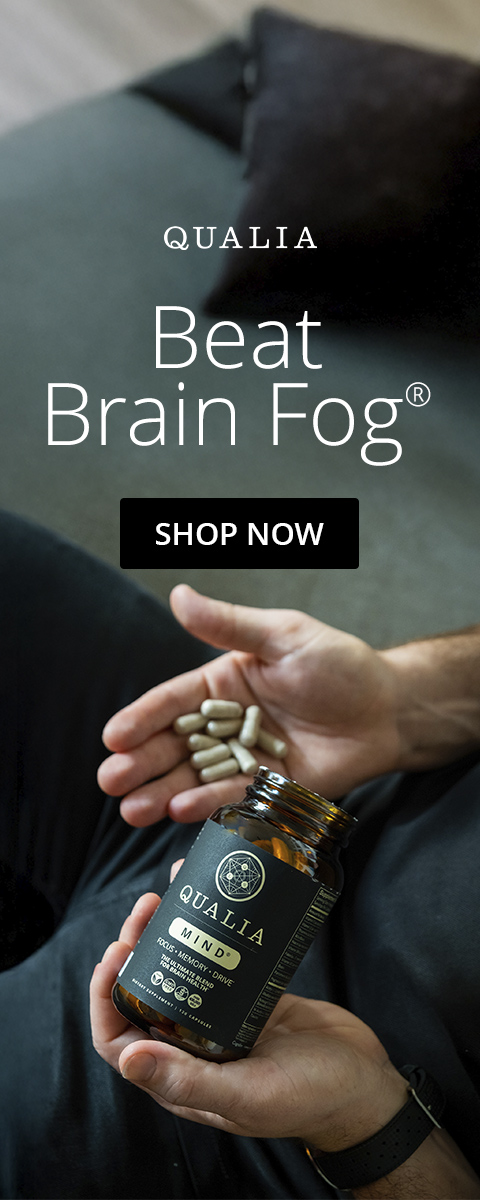What is Brain Fog?
Brain fog is a term used to describe the feeling of low mental energy, distraction, lack of motivation, and difficulty focusing. Experiencing one or more of these is relatively common when you are overworked, stressed, or lacking sleep, for example. You might be surprised to learn that brain fog is not a medical condition; it’s a clue that suggests there may be something interfering with your mental performance.
Brain fog affects your capacity to exert mental effort, meaning that concentrating, planning, making decisions, or multitasking can all become arduous tasks. The feeling of fatigue that brain fog may carry can also extend to physical activities, so anything from work to simple daily routines may potentially be undermined (or made more difficult) by brain fog.
What Exactly Does Brain Fog Feel Like?
Brain fog is not a specific thing; it’s a general feeling of mental tiredness that can manifest differently from person to person. Brain fog usually manifests as one or more of these experiences:
- Mental fatigue
- Lack of mental clarity
- Sluggish thinking
- Clouded judgment
- Difficulty focusing attention
- Difficulty to concentrate
- Difficulty blocking out distractions
- Delayed word recall
- Scattered short-term memory
- Difficulty keeping a train of thought
- Lack of motivation
5 Lifestyle-Related Causes of Brain Fog
There are many possible contributors to brain fog, some easier to spot than others. Brain fog can be caused by physiological changes or certain types of medication, for example. But quite often, brain fog is simply a consequence of lifestyle patterns: overworking, stress, poor sleep, too much screen time, or unhealthy diets, for example. Or, most likely, it may result from a combination of these factors.
So let’s take a look at some of the main lifestyle-related causes of brain fog, what you can do to manage them, and how Qualia products may help.*
Stress
Ongoing stress can be highly detrimental to both the body and the mind. Psychological stress affects endocrine signaling, influences physiological processes at a systemic level, and is associated with problems such as fatigue, burnout, mood fluctuations, and social disengagement. Brain fog is a common consequence of stress.
One of the reasons why stress may cause brain fog is because it drains mental energy. Stress puts the body and mind in an energy-consuming state of alertness. The body’s metabolic capacity to generate energy is limited, which leads to trade-offs between different energy-demanding functions. Because exposure to stressors is interpreted at a physiological level as a threat, the allocation of energy to stress responses takes priority over other physiological functions, including some aspects of cognitive performance. Psychological stress sends the body into fight-or-flight mode and our mental energy resources are allocated to support those responses [1,2].
Stress interferes with normal cognitive functions by consuming cognitive resources [3]. We may feel exhausted or drained after facing a stressful situation because there is a real energetic cost to dealing with stress. The immediate reaction to stress is evolutionarily adaptive, as it mobilizes energy to help the organism deal with stressors in challenging situations [4]. However, ongoing stress is maladaptive and leads to exhaustion, particularly in the absence of opportunities to restore energy [5]. One of the consequences of this mental and physical exhaustion is brain fog [6].
Poor Sleep
Sleep is essential for a healthy mind. Among its many important functions, sleep is regenerative, supports the clean-up of everyday metabolic waste in the brain, impacts metabolism and energy production, supports memory consolidation and learning, and influences cognitive performance and mood during the day [10,11]. Good sleep is essential for feeling energetic, motivated, and capable.
The most immediate consequence of not meeting your sleep needs is feeling sleepy and tired the following day. An occasional poor night’s sleep may make your mind sluggish during the day, but you’ll probably feel better after a restful night. However, when poor sleep is persistent, your brain is consistently not getting what it needs to function optimally.
The most common effects of sleep loss and poor sleep quality are reduced alertness, attention, vigilance, and processing speed, and consequently, a negative impact on all the mental tasks that rely on these capacities. Poor sleep also affects emotional processing and cognitive processes with an emotional component, which can result in a poorer capacity to cope with stress and control emotions, which also ends up affecting mental performance in general [12]. Together, these changes often manifest as brain fog.
Physical Inactivity
“Sitting is the new smoking” is a phrase you may have already heard. It has been widely used to highlight just how bad sedentarism may be for health. There are several studies linking sedentary behaviors and physical inactivity with poorer health outcomes, particularly poorer metabolic and cardiovascular health [17,18], but also sleep disturbances [19], cognitive issues [20,21], and premature aging [22], to name a few.
The cardiovascular and metabolic consequences of sedentarism are particularly relevant because they are key determinants of general health and well-being. Because of the brain’s very high energy demand, and consequently, its need for effective delivery and use of nutrients and oxygen, the brain is particularly sensitive to poor vascular and metabolic health. Therefore, maintaining cerebral blood flow and metabolism are two elements of brain health and healthy brain function that can play a significant part in the experience of brain fog. If your brain isn’t getting the oxygen and fuel it needs, it won’t work as effectively as it could, which may manifest as brain fog.
Accordingly, sedentary behaviors such as prolonged sitting have been linked to poorer cognitive performance, physical and mental fatigue, and lack of motivation [21,23–25], all of which are associated with brain fog.
Diet
Our dietary choices are of utmost importance for our physical and mental health. What we eat influences every physiological process because food is the source of all the nutrients our body needs to generate energy and build molecules. Our dietary patterns influence glucose and oxygen supply to the brain, which given the brain’s energetic needs, is already enough to have a huge impact on cognitive function. But the influence of diet on brain function goes way beyond brain energy production. For example, food supplies many nutrients that are used in the synthesis of neurotransmitters and other brain molecules. These include vitamins and minerals necessary for the activity of enzymes and molecules that act as precursors to neurotransmitters. For example, choline and the amino acids L-tyrosine and L-tryptophan are precursors for the neurotransmitters acetylcholine, dopamine, and serotonin, respectively. Diet also supplies compounds that may not be directly used in energy production and molecule synthesis, but that may facilitate or even stimulate those processes or influence signaling pathways that do so, for example.
When the supply of brain nutrients is inadequate, any brain function that relies on those nutrients may potentially be affected. And that’s every brain function. Furthermore, even if all the nutrients the brain needs are included in the diet, there are foods that may affect how and how well our body and brain use them. Unhealthy foods may hurt nutrient absorption, tissue delivery, metabolism, and signaling pathways that regulate metabolism. They may also influence the brain’s detox capacity, leading to oxidative stress and the accumulation of undesirable metabolic byproducts that may manifest as brain fog.
Gut Health
The microbes that live in our gut, collectively known as the gut microbiota, produce several molecules that can influence several aspects of brain function. They do so through the gut-brain axis, a bidirectional communication system that links the brain to the gut and the gut microbiota and allows them to influence each other [33].
Communication through the gut-brain axis takes place through the nervous, endocrine, and immune systems, all of which play a part in modulating brain function. Microbial metabolites include neurotransmitters such as serotonin, dopamine, norepinephrine, and GABA, and other neuroendocrine and neuroimmune modulators, such as short-chain fatty acids (SCFA), for example. These metabolites can modulate the activity of the nervous, endocrine, and immune systems in ways that may influence mood, stress responses, behavior, and cognition [34–37].
With a healthy gut microbiota, their influence is balanced and can be regarded as part of normal brain processes.
How to Clear Brain Fog Effectively
Reduce Stressors When Possible
What’s tricky about stress is that eliminating stressors from our lives is not always possible as there are things that are simply beyond our control in our personal and professional lives. The next best thing is to find strategies to better cope with stress that may help us rein in its effects. These may include activities that help to support stress resilience such as yoga, meditation, and exercise [7–9].
Implement a Healthy Sleep Schedule
An important thing to keep in mind is that a good night’s sleep is about more than just time spent sleeping, it’s also about the quality of sleep [13,14]. The brain needs to go through all the stages of sleep for it to be effective and regenerative. Good basic sleep hygiene may help you have a sound sleep: set a sleep schedule; make sure your bedroom is dark, silent, relaxing, and at a cool but comfortable temperature; unplug from electronic devices 30-60 min before bedtime; and avoid large meals, caffeine, and alcohol late in the evening [15,16]. For many people, avoiding caffeine anytime after noon can make a difference.
Healthy lifestyle choices help to create the right setting for sound sleep, but sleep may still be further optimized. Because we know how important nighttime physiology is for daytime performance, we developed Qualia Night to give you extra support for restorative sleep.*
Qualia Night is a nighttime nootropic designed to help users perform better during their days by helping with nightly relaxation and rejuvenation. Qualia Night was designed to broadly support many areas of sleep quality. These include helping with feeling more calm and relaxed at night (i.e., readiness for sleep), soundness of sleep and vividness of dreams, and waking feeling more refreshed and ready for the next day. Qualia Night helps the body shift into the relaxation and rejuvenation modes needed to get a sounder night’s sleep and better next-day performance.* Read more about the Qualia Night ingredients.
Get Regular Consistent Exercise
Physical activity and exercise help to maintain healthy brain function, support cerebral blood flow and metabolism, and by doing so, may help to prevent brain fog. Studies have shown that breaking up prolonged sitting with physical activity breaks (like standing, a light-intensity walk, stair climbing, or calisthenic exercises for example), prevents a decline in cerebral blood flow [26], improves cardiovascular parameters [27] and metabolic markers [28], helps to delay fatigue [24], reduces physiological responses to psychological stress [29], and supports mental performance, namely attention and executive function [30].
We are aware of how fundamental cerebral blood flow and metabolism are for cognitive performance and preventing brain fog, which is why supporting them was one of our goals when we designed Qualia Mind. Qualia Mind is a nootropic supplement containing a complex mixture of vitamins, minerals, amino acids, choline donors, and herbal ingredients chosen with the goal of supporting cognitive function through distinct mechanisms of action. Among them are a set of ingredients that help the brain generate the energy and molecules it needs to work at its best, both by supporting oxygen and nutrient delivery, and their utilization. These include vitamins that act as cofactors in metabolic pathways, molecules that support brain mitochondrial function and energy generation, precursors that provide building blocks for neurotransmitters and other brain molecules, and ingredients that promote healthy cerebrovascular function.* Read more about the Qualia Mind ingredients.
Maintain a Healthy Balanced Diet
A healthy diet supplies everything the brain needs nutritionally. Eating foods to curb brain fog consists of a diversified diet with plenty of fruits, vegetables, healthy fats, and unprocessed protein, and avoiding alcohol and processed, salty, highly palatable fatty, and sugary foods. Also, make sure you’re not eating anything you may be allergic to or sensitive to, as those foods may affect metabolism and brain function. For example, people with gluten sensitivity report brain fog [31]. And don’t forget the brain also needs plenty of water [32].
Support a Resilient Gut Microbiome
When the gut microbiota is out of balance, so is its influence on brain function. This can result in changes in neuroendocrine and neuroimmune signaling, and consequently, in the dysregulation of the brain processes the gut microbiota supports. Changes in the composition of the gut microbiota have been linked to impaired emotional regulation, negative mood states, unhealthy stress responses, and poorer cognitive performance [38–42].
Because an unhealthy gut microbiota may be a cause of brain fog, supporting gut health and the balance of the gut microbiota may help to prevent it. This can be done by following a diverse, healthy, gut-friendly diet rich in fruits, vegetables, and grains, which are good sources of fermentable fibers that feed commensal gut microbes, and avoiding processed foods, excess sugar, and unhealthy fats [43].
Additional support may be found in psychobiotics, which are probiotics and prebiotics that have been shown to help beneficially modulate the composition and activity of the gut microbiota and influence gut-brain communication through the gut-brain axis to support healthy stress responses, mood, and cognition [44,45]. This was one of our purposes when we developed Qualia Probiotic+, a supplement containing a mixture of probiotics, prebiotics, and other gut-brain ingredients designed to support healthy gut function, a balanced gut microbiota, and gut-brain axis signaling.*
Qualia Energy Shot™: Up With No Downsides
When brain fog stands in the way of your productivity, a quick, clean boost can make all the difference. Combining nootropic compounds, adaptogens, and NAD+ boosters, Qualia Energy Shot™ is designed to enhance energy, mental clarity, and focus—all while supporting long-term brain health.*
This innovative formula works by promoting acetylcholine and dopamine signaling, supporting serotonin production, and upregulating antioxidant defenses to keep your brain sharp and protected.* With just the right amount of caffeine and low sugar, it delivers sustained energy without the crash, so you can stay alert, clear-headed, and ready to take on the day.
Say goodbye to brain fog and hello to productivity with Qualia Energy Shot™—premium fuel for both energy and cognition.
References
[1]I.M. Sokolova, Integr. Comp. Biol. 53 (2013) 597–608.
[2]G. Russell, S. Lightman, Nat. Rev. Endocrinol. 15 (2019) 525–534.
[3]N. Tsai, J.S. Eccles, S.M. Jaeggi, Brain Cogn. 133 (2019) 54–59.
[4]F.S. Dhabhar, Front. Neuroendocrinol. 49 (2018) 175–192.
[5]M.F. Dallman, S. Bhatnagar, Comprehensive Physiology (2011).
[6]K. Glise, G. Ahlborg Jr, I.H. Jonsdottir, BMC Psychiatry 14 (2014) 118.
[7]A.L. Francis, R.C. Beemer, Complement. Ther. Med. 43 (2019) 170–175.
[8]Y.-Y. Tang, B.K. Hölzel, M.I. Posner, Nat. Rev. Neurosci. 16 (2015) 213–225.
[9]B. Stubbs, D. Vancampfort, S. Rosenbaum, J. Firth, T. Cosco, N. Veronese, G.A. Salum, F.B. Schuch, Psychiatry Res. 249 (2017) 102–108.
[10]K.C. Simon, L. Nadel, J.D. Payne, Proc. Natl. Acad. Sci. U. S. A. 119 (2022) e2201795119.
[11]M.R. Zielinski, J.T. McKenna, R.W. McCarley, AIMS Neurosci 3 (2016) 67–104.
[12]W.D.S. Killgore, Prog. Brain Res. 185 (2010) 105–129.
[13]S.J. McCarter, P.T. Hagen, E.K. St Louis, T.M. Rieck, C.R. Haider, D.R. Holmes, T.I. Morgenthaler, Sleep Med. Rev. 64 (2022) 101657.
[14]A.J. Scott, T.L. Webb, M. Martyn-St James, G. Rowse, S. Weich, Sleep Med. Rev. 60 (2021) 101556.
[15]M. Sejbuk, I. Mirończuk-Chodakowska, A.M. Witkowska, Nutrients 14 (2022).
[16]O. Troynikov, C.G. Watson, N. Nawaz, J. Therm. Biol. 78 (2018) 192–203.
[17]E.G. Wilmot, C.L. Edwardson, F.A. Achana, M.J. Davies, T. Gorely, L.J. Gray, K. Khunti, T. Yates, S.J.H. Biddle, Diabetologia 55 (2012) 2895–2905.
[18]L.F.M. de Rezende, M. Rodrigues Lopes, J.P. Rey-López, V.K.R. Matsudo, O. do C. Luiz, PLoS One 9 (2014) e105620.
[19]Y. Yang, J.C. Shin, D. Li, R. An, Int. J. Behav. Med. 24 (2017) 481–492.
[20]S. Yan, W. Fu, C. Wang, J. Mao, B. Liu, L. Zou, C. Lv, Transl. Psychiatry 10 (2020) 112.
[21]R.S. Falck, J.C. Davis, T. Liu-Ambrose, Br. J. Sports Med. 51 (2017) 800–811.
[22]J. Raffin, P. de Souto Barreto, A.P. Le Traon, B. Vellas, M. Aubertin-Leheudre, Y. Rolland, Ageing Res. Rev. 83 (2023) 101807.
[23]M.J. Koohsari, T. Nakaya, G.R. McCormack, A. Shibata, K. Ishii, K. Oka, JMIR Public Health Surveill 7 (2021) e26293.
[24]P. Wennberg, C.-J. Boraxbekk, M. Wheeler, B. Howard, P.C. Dempsey, G. Lambert, N. Eikelis, R. Larsen, P. Sethi, J. Occleston, J. Hernestål-Boman, K.A. Ellis, N. Owen, D.W. Dunstan, BMJ Open 6 (2016) e009630.
[25]I. Engberg, J. Segerstedt, G. Waller, P. Wennberg, M. Eliasson, BMC Public Health 17 (2017) 654.
[26]S.E. Carter, R. Draijer, S.M. Holder, L. Brown, D.H.J. Thijssen, N.D. Hopkins, J. Appl. Physiol. 125 (2018) 790–798.
[27]G.O. da Silva, L.B. Santini, B.Q. Farah, A.H. Germano-Soares, M.A. Correia, R.M. Ritti-Dias, Int. J. Sports Med. 43 (2022) 97–106.
[28]R. Loh, E. Stamatakis, D. Folkerts, J.E. Allgrove, H.J. Moir, Sports Med. 50 (2020) 295–330.
[29]A.J. Chauntry, N.C. Bishop, M. Hamer, N.J. Paine, Ann. Behav. Med. (2022).
[30]B.C.R. Chrismas, L. Taylor, A. Cherif, S. Sayegh, D.P. Bailey, PLoS One 14 (2019) e0219565.
[31]I.D. Croall, N. Hoggard, I. Aziz, M. Hadjivassiliou, D.S. Sanders, PLoS One 15 (2020) e0238283.
[32]J. Zhang, G. Ma, S. Du, S. Liu, N. Zhang, Nutrients 13 (2021).
[33]C.R. Martin, V. Osadchiy, A. Kalani, E.A. Mayer, Cell Mol Gastroenterol Hepatol 6 (2018) 133–148.
[34]J.G. Hensler, in: C.P. Müller, B.L. Jacobs (Eds.), Handbook of Behavioral Neuroscience, Elsevier, 2010, pp. 367–378.
[35]C. Chiapponi, F. Piras, F. Piras, C. Caltagirone, G. Spalletta, Front. Psychiatry 7 (2016) 61.
[36]H.G. Ruhé, N.S. Mason, A.H. Schene, Mol. Psychiatry 12 (2007) 331–359.
[37]Z.Y. Kho, S.K. Lal, Front. Microbiol. 9 (2018) 1835.
[38]Y. Chen, J. Xu, Y. Chen, Nutrients 13 (2021).
[39]M.G. Gareau, Int. Rev. Neurobiol. 131 (2016) 227–246.
[40]E.E. Fröhlich, A. Farzi, R. Mayerhofer, F. Reichmann, A. Jačan, B. Wagner, E. Zinser, N. Bordag, C. Magnes, E. Fröhlich, K. Kashofer, G. Gorkiewicz, P. Holzer, Brain Behav. Immun. 56 (2016) 140–155.
[41]C. Barrio, S. Arias-Sánchez, I. Martín-Monzón, Psychoneuroendocrinology 137 (2022) 105640.
[42]S. Cussotto, K.V. Sandhu, T.G. Dinan, J.F. Cryan, Front. Neuroendocrinol. 51 (2018) 80–101.
[43]E.R. Leeming, A.J. Johnson, T.D. Spector, C.I. Le Roy, Nutrients 11 (2019).
[44]T.G. Dinan, C. Stanton, J.F. Cryan, Biol. Psychiatry 74 (2013) 720–726.
[45]V. Luang-In, T. Katisart, A. Konsue, S. Nudmamud-Thanoi, A. Narbad, W. Saengha, E. Wangkahart, S. Pumriw, W. Samappito, N.L. Ma, Food Sci Anim Resour 40 (2020) 1014–1032.
[46]K. Trikojat, A. Buske-Kirschbaum, F. Plessow, J. Schmitt, R. Fischer, Clin. Exp. Allergy 47 (2017) 479–487.
[47]P.S. Marshall, C. O’Hara, P. Steinberg, Ann. Allergy Asthma Immunol. 84 (2000) 403–410.
[48]I. Hartgerink-Lutgens, A. Vermeeren, E. Vuurman, B. Kremer, Clin. Exp. Allergy 39 (2009) 500–508.
[49]H. Sarlus, C.O. Höglund, B. Karshikoff, X. Wang, M. Lekander, M. Schultzberg, M. Oprica, J. Cell. Mol. Med. 16 (2012) 2401–2412.
[50]M.I. Silvani, R. Werder, C. Perret, Front. Physiol. 13 (2022) 943108.
[51]G.W. Small, J. Lee, A. Kaufman, J. Jalil, P. Siddarth, H. Gaddipati, T.D. Moody, S.Y. Bookheimer, Dialogues Clin. Neurosci. 22 (2020) 179–187.
[52]N. Stiglic, R.M. Viner, BMJ Open 9 (2019) e023191.
[53]J. Owolabi, O.S. Ilesanmi, A. Luximon-Ramma, Cureus 13 (2021) e18211.
[54]R.J. Sram, M. Veleminsky Jr, M. Veleminsky Sr, J. Stejskalová, Neuro Endocrinol. Lett. 38 (2017) 389–396.
[55]M.A. Shehab, F.D. Pope, Sci. Rep. 9 (2019) 8237.
[56]M.J. Zare Sakhvidi, J. Yang, E. Lequy, J. Chen, K. de Hoogh, N. Letellier, M. Mortamais, A. Ozguler, D. Vienneau, M. Zins, M. Goldberg, C. Berr, B. Jacquemin, Lancet Planet Health (2022) e219–e229.
[57]J.M. Delgado-Saborit, V. Guercio, A.M. Gowers, G. Shaddick, N.C. Fox, S. Love, Sci. Total Environ. 757 (2021) 143734.
[58]O. Hahad, J.H. Prochaska, A. Daiber, T. Muenzel, Oxid. Med. Cell. Longev. 2019 (2019) 4623109.
[59]M. Zaman, M. Muslim, A. Jehangir, Environ. Sci. Pollut. Res. Int. 29 (2022) 76485–76500.
[60]L. Tzivian, A. Winkler, M. Dlugaj, T. Schikowski, M. Vossoughi, K. Fuks, G. Weinmayr, B. Hoffmann, Int. J. Hyg. Environ. Health 218 (2015) 1–11.[61]M. Basner, S. McGuire, Int. J. Environ. Res. Public Health 15 (2018).
[62]P. Horvat, R. Kubinova, A. Pajak, A. Tamosiunas, B. Schöttker, H. Pikhart, A. Peasey, M. Kozela, E. Jansen, A. Singh-Manoux, M. Bobak, Dement. Geriatr. Cogn. Disord. 42 (2016) 297–309.
[63]I.V. Papathanasiou, E.C. Fradelos, F. Malli, I. Stefanidis, E. Zintzaras, C. Doxani, Wiad. Lek. 74 (2021) 1995–2003.
[64]F. Franzoni, G. Scarfò, S. Guidotti, J. Fusi, M. Asomov, C. Pruneti, Front. Neurosci. 15 (2021) 729757.
[65]A. Kandlur, K. Satyamoorthy, G. Gangadharan, Front. Mol. Neurosci. 13 (2020) 41.








No Comments Yet
Sign in or Register to Comment